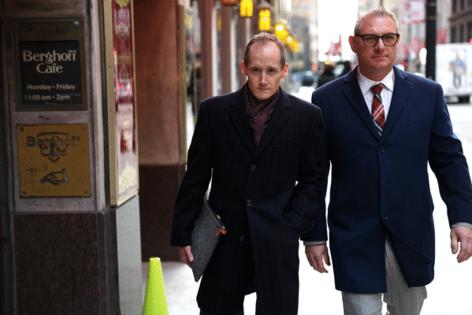Former Madigan lieutenant gives jurors in corruption case insider look at speaker's power
Published in News & Features
A former lieutenant for Michael Madigan resumed his testimony Wednesday in the ex-speaker’s corruption case, where he’s giving jurors an insider look at Madigan’s influence over legislation in Springfield and Democratic Party politics.
Will Cousineau, who wore dual hats as both Madigan’s issues director in the House and also political director of the Democratic Party of Illinois, was called late in the day Tuesday in Madigan’s trial, which is now in its second week of testimony at the Dirksen U.S. Courthouse.
Cousineau, now a high-powered lobbyist, previously testified in the “ComEd Four” case last year, as well as the separate perjury trial of Tim Mapes, the speaker’s longtime chief of staff.
With Cousineau on the stand Wednesday morning, prosecutors played a wiretapped recording of a December 2018 strategy meeting between Madigan and several members of his inner circle, including Cousineau and McClain.
The meeting, held about a month after the 2018 election, offered a rare behind-the-scenes look at the way Madigan’s team strategized to put certain people in positions of power.
Madigan and McClain talked openly about appointing committee leaders who could be trusted to withstand pressure from groups like the Service Employees International Union, and potentially kill bills by putting them in a dead-end subcommittee. Repeatedly, McClain emphasized the importance of appointing people who could take actions that wouldn’t have Madigan’s “fingerprints.”
A strong new Human Services committee chair, McClain told Madigan, should “protect some of the people that are our allies, strong allies of the House Democratic Caucus … without your fingerprints.”
“In other words,” McClain continued, “you don’t have to kill a bill or, or an amendment in (the Rules Committee), the chairperson is strong enough to put it in a quote-unquote working subcommittee.”
The meeting also reinforced the uncommonly strong ties between McClain and Madigan.
McClain was a longtime lobbyist who never worked on the Speaker’s staff. Nonetheless, he offered to come up with ideas for which legislators should be appointed to serve on committees, and Madigan assented, telling him and others on the call to send their suggestions to his chief of staff.
Cousineau testified McClain was also present when the speaker convened meetings on the Future Energy Jobs Act legislation, also known as FEJA, a bill that ComEd was pushing in 2016 and is at the heart of the corruption allegations.
“I don’t know exactly why the speaker invited him,” Cousineau said. “I recall him talking about the interests of the company but certainly he understood the needs of the speaker.”
While McClain was in on the meetings, one person was notably not invited: state Rep. Bob Rita, whom Madigan had made the bill’s chief sponsor, according to Cousineau’s testimony.
Shortly before the FEJA vote on the House floor, Cousineau testified he learned through a roll call analysis that “there were not enough votes to pass the bill.” He relayed the information to Madigan, who told him, “I was to go out and work the bill and try to get it passed,” Cousineau said.
The last minute push worked, and FEJA passed the House on Dec. 1, 2016.
Testifying in a quiet voice and seeming slightly uncomfortable, Cousineau told the jury at the outset of his testimony Tuesday that he was granted immunity by the U.S. attorney’s office, meaning he cannot be charged if he tells the truth.
In his roughly 45 minutes on the stand Tuesday, Cousineau walked the jury through all the ways that Madigan had control, saying the speaker was the ultimate decision-maker on everything from where campaign money was sent to who got legislative leadership positions or plum committee assignments.
Cousineau also testified that Madigan famously had no cellphone or email account of his own, and that staffers often called Madigan’s law office or ward headquarters to reach him.
Madigan watched Cousineau’s testimony intently but didn’t show any outward reaction to anything he said. When the trial broke at 5 p.m., Cousineau got down from the witness stand and shimmied past the jury box, as far from the defense table as possible.
Madigan, 82, of Chicago, who served for decades as speaker of the Illinois House and the head of the state Democratic Party, faces racketeering charges alleging he ran his state and political operations like a criminal enterprise, scheming with utility giants ComEd and AT&T to put his cronies on contracts requiring little or no work and using his public position to drum up business for his private law firm.
Both Madigan and co-defendant Michael McClain, 77, a former ComEd contract lobbyist from downstate Quincy, have pleaded not guilty and denied wrongdoing.
In his testimony in the ComEd Four case last year, Cousineau outlined how last-minute arm-twisting orchestrated by the speaker on the House floor in 2016 made the difference between passing the Future Energy Jobs Act championed by ComEd or coming up several votes short.
Cousineau testified in that trial he warned Madigan and McClain in a phone call only days before the vote that a projected roll call showed the legislation did not have the 60 votes necessary to pass in the legislative fall veto session.
Madigan, he said, set in motion a full-court press in which Cousineau and his staff ginned up enough support from lawmakers and advocates who could help turn the tide.
Cousineau is the 8th witness to testify in Madigan’s trial, which began Oct. 8 and is scheduled to last until at least mid-December.
____
©2024 Chicago Tribune. Visit at chicagotribune.com. Distributed by Tribune Content Agency, LLC.







Comments